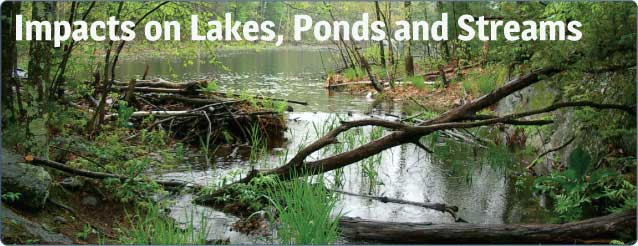
Photo Credit: John Monroe, National Park Service
Lakes, Ponds, Coldwater Streams, and Warmwater Streams
Freshwater aquatic ecosystems include major rivers, riparian areas, coldwater and warmwater streams, lakes, ponds, kettle ponds and vernal pools. These important assets provide diverse habitats supporting numerous plant and animal species and providing vital ecosystem functions.
Impacts of Climate Change
Cold-adapted habitats that predominantly occur in northern New England are close to the southern edge of their range in Rhode Island and are at risk from increased temperatures related to climate change and shifting global weather patterns. Climate change is likely to result in a reduction in the overall extent of coldwater habitats since streams at lower elevations will be more vulnerable to temperature increases, however higher elevations can better maintain coldwater habitats. These habitats are likely to shrink in size and extent rather than disappearing entirely. Protecting vulnerable coldwater ecosystems is important in order to preserve habitat for sensitive cold-adapted species such as brook trout.
Aquatic systems are susceptible to impacts from flooding, including erosion of stream banks, water quality degradation and damage to aquatic habitats, potentially making them unsuitable for certain species. Freshwater aquatic habitats are also highly vulnerable to drought, which is anticipated to increase in frequency and intensity during summer months under projected climate change scenarios.
The Northeast trends of the past decades show less frequency of dry years. While low-water years are critical to the preservation of the rare and endemic shore vegetation, drought conditions can cause vernal pools and kettle ponds to dry out more rapidly, negatively impacting the reproductive cycles of numerous amphibian species. More intense rain events, one of the potential impacts of climate change, are likely to cause more erosion and sedimentation along
 Photo Credit: O. Van Dyke
stream banks, impacting water clarity and spawning sites for native fish species.
Photo Credit: O. Van Dyke
stream banks, impacting water clarity and spawning sites for native fish species.
One potential result of increased precipitation and more intense rainfall events is that vernal pools may increase in size and retain water for several years in a row, enabling the introduction of fish populations that feed on amphibians, further threatening vulnerable amphibian species. Another serious risk posed to aquatic freshwater habitats is the conversion of rare habitat types, such as the transformation of coldwater to warmwater streams and tidal marshes to submerged lands. The continued reduction in suitable freshwater aquatic habitat for climate change-threatened species will likely impact the use of public and private lands by the citizens of Rhode Island and the revenue derived from recreation such as fishing and tourism.
Non-climate stressors. In addition to climate change related environmental stressors, it is important to remember that non-climate stressors such as development, habitat fragmentation, decreased water quality from point and non-point source pollution also play a significant role in ecosystem changes in this habitat.
“Parents wonder why the streams are bitter, when they themselves have poisoned the fountain.”
– John Locke
News
“Tourists Are Flocking to Locations Threatened by Climate Change. That Only Makes Things Worse.” Vox
Factoids
Rhode Island will experience a significant increase in intense rain events and decreasing ice coverage and snowfall. As a consequence, Rhode Island’s rivers, lakes, ponds, and streams may experience more intense and frequent droughts and floods.
Springtime melt of snow plays an important role in the time and magnitude of runoff. Future climate change is expected to have an effect on snowmelt in various regions, and any shift in snowmelt timing will influence the timing of streamflow and water resource sustainability.




